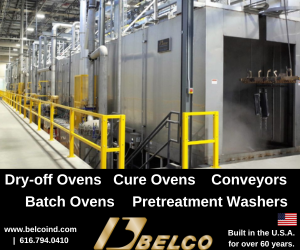Masking Painted Parts
When paint is applied to the instrument cases we manufacture it coats the threads of the tapped holes, causing difficulties in further assembly.Will changing the settings on the electrostatic gun help keep paint from coating the threads?
Q. We manufacture differential pressure measuring devices for the chemical processing industry and just switched from conventional to electrostatic spray guns on the paint line for instrument cases. These cases are ¼-inch aluminum castings with many tapped holes. When the paint is applied with the new electrostatic spray guns, it coats the threads of the tapped holes, causing difficulties in further assembly, so we are forced to re-tap the threads after painting. All the holes are drilled and tapped at the same time using our specially designed machine, but in order to take advantage of this machine, we need a method to keep the paint from coating the threads. Will changing the settings on the electrostatic gun help? If we insist on tapping before painting, do you have a better idea to help us? S.T.
A. One of the advantages of using electrostatic spray guns for paint application is that all surfaces are coated during the process. In order to avoid painting critical internal and external surface areas, they must be masked. It is not possible for you to control deposition of paint in a helpful manner by adjusting the electrostatics.
It would seem that drilling and tapping after painting is a viable method if the cured paint is tough enough to withstand handling and machining. I suggest you mask the holes before painting using silicone rubber plugs. An alternate method would be screwing mold-release-coated bolts into the holes to keep them paint free. Another approach would be tapping the holes slightly oversized, allowing the paint film to make up the difference.
To find suppliers of masking devices, go to PFOnline and click on Suppliers, then Painting, then Masking Devices, spray painting.
Related Content
-
Conveyors and Paint Systems
Choosing the right conveyor system, coating technology, and ancillary equipment.
-
Curing Oven Basics
Simply heating up the substrate does not cure the coating. There are many variables to consider when choosing the best cure oven for your application...
-
Finishing Systems Provider Celebrates 150 Years, Looks to Future
From humble beginnings as an Indiana-based tin shop, Koch Finishing Systems has evolved into one of the most trusted finishing equipment providers in the industry.












